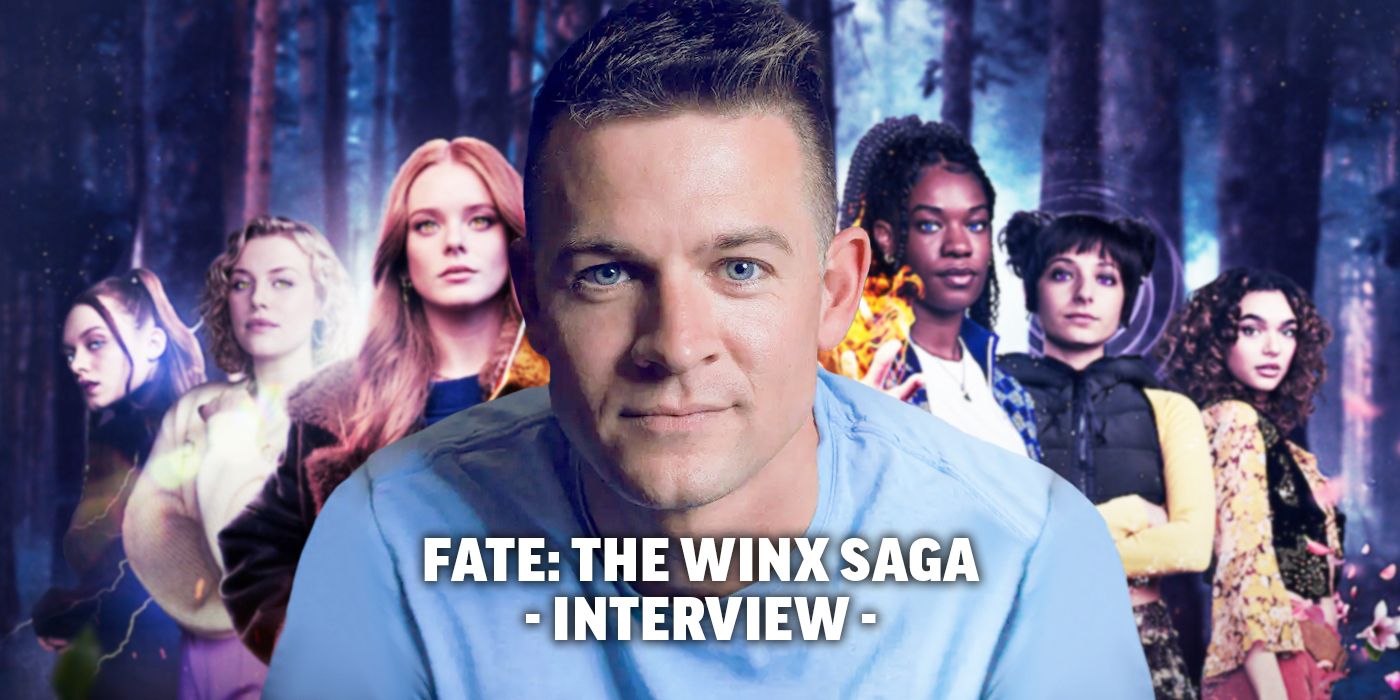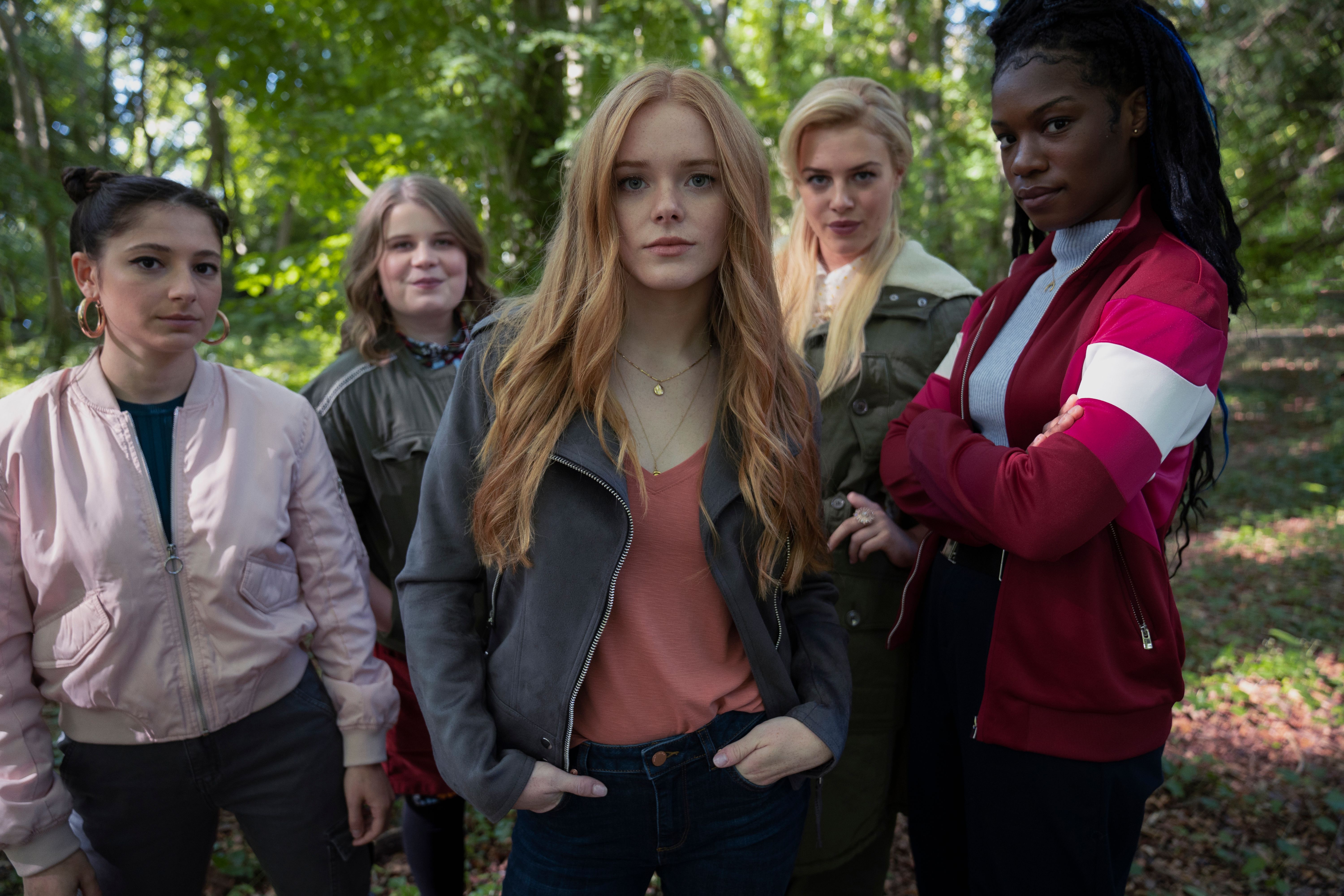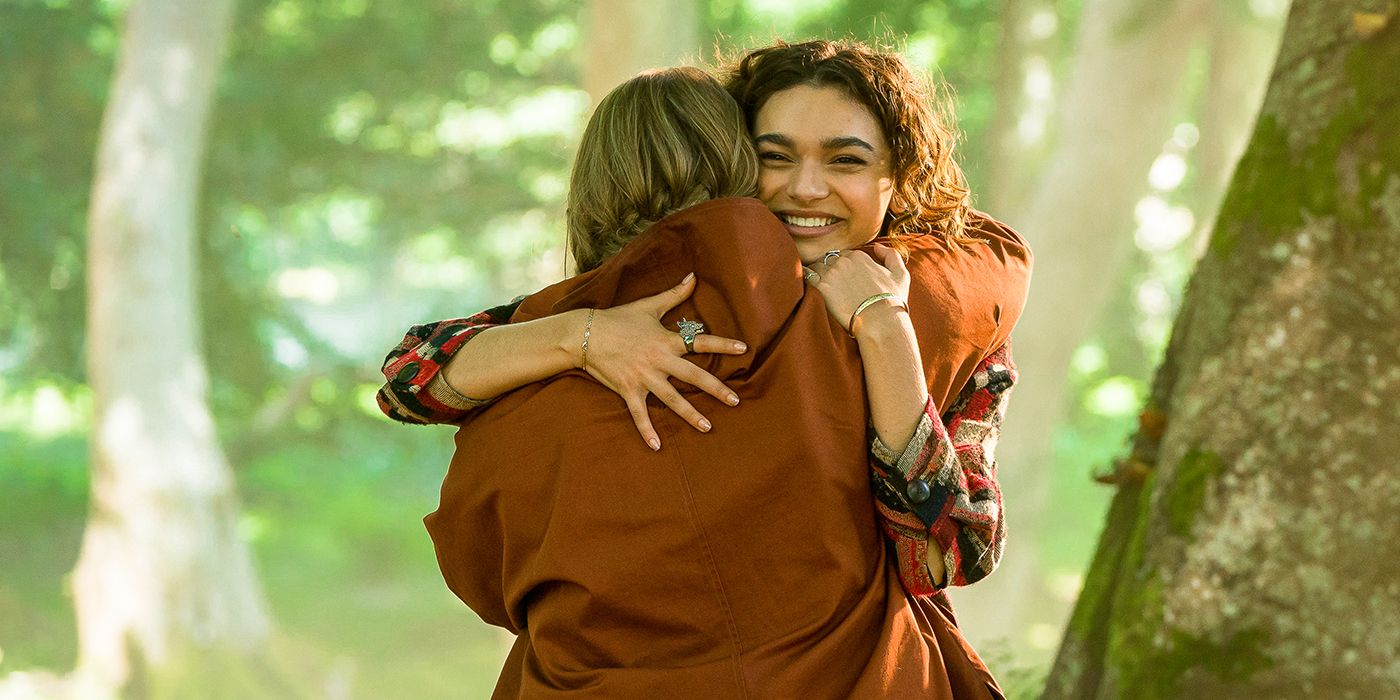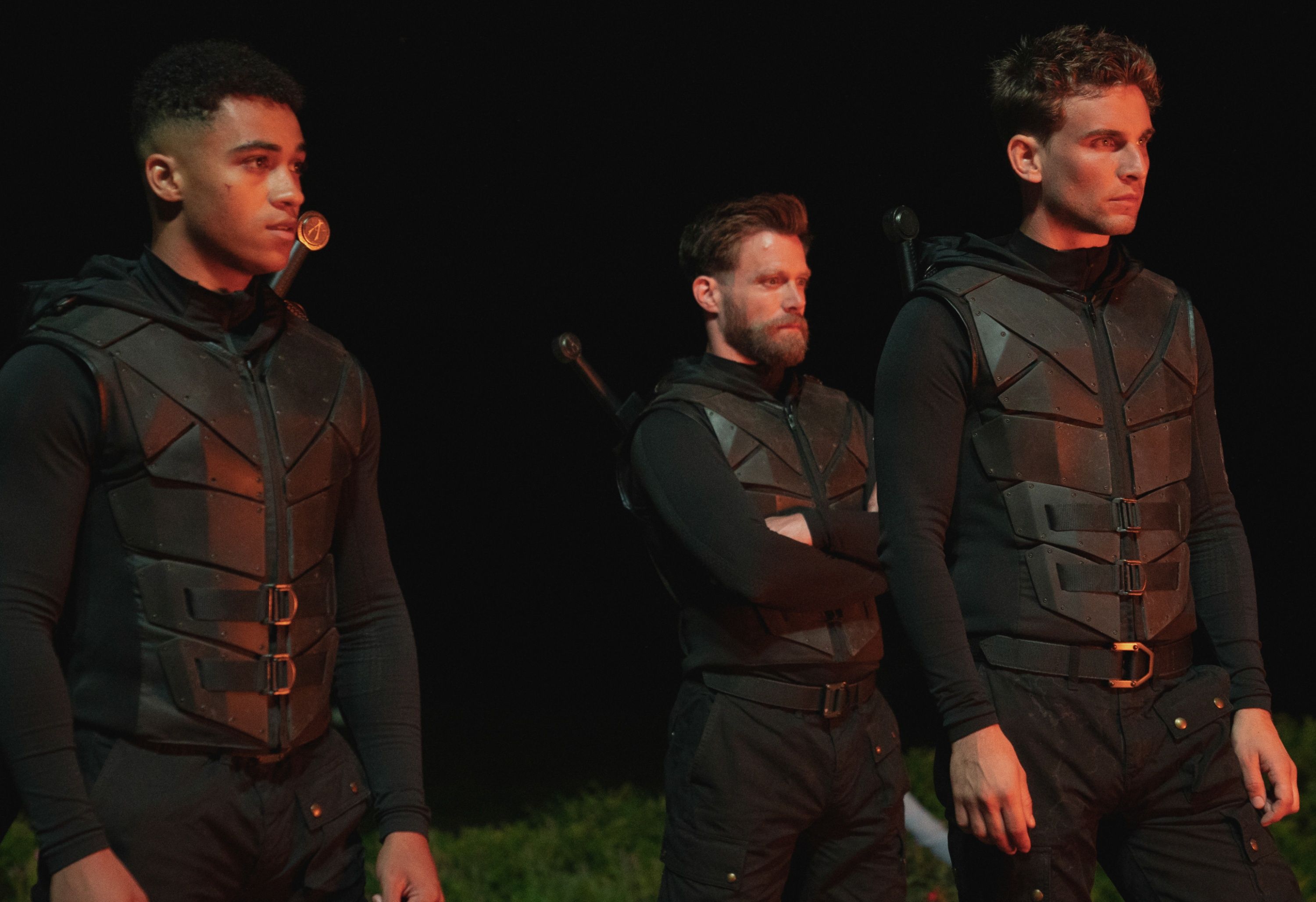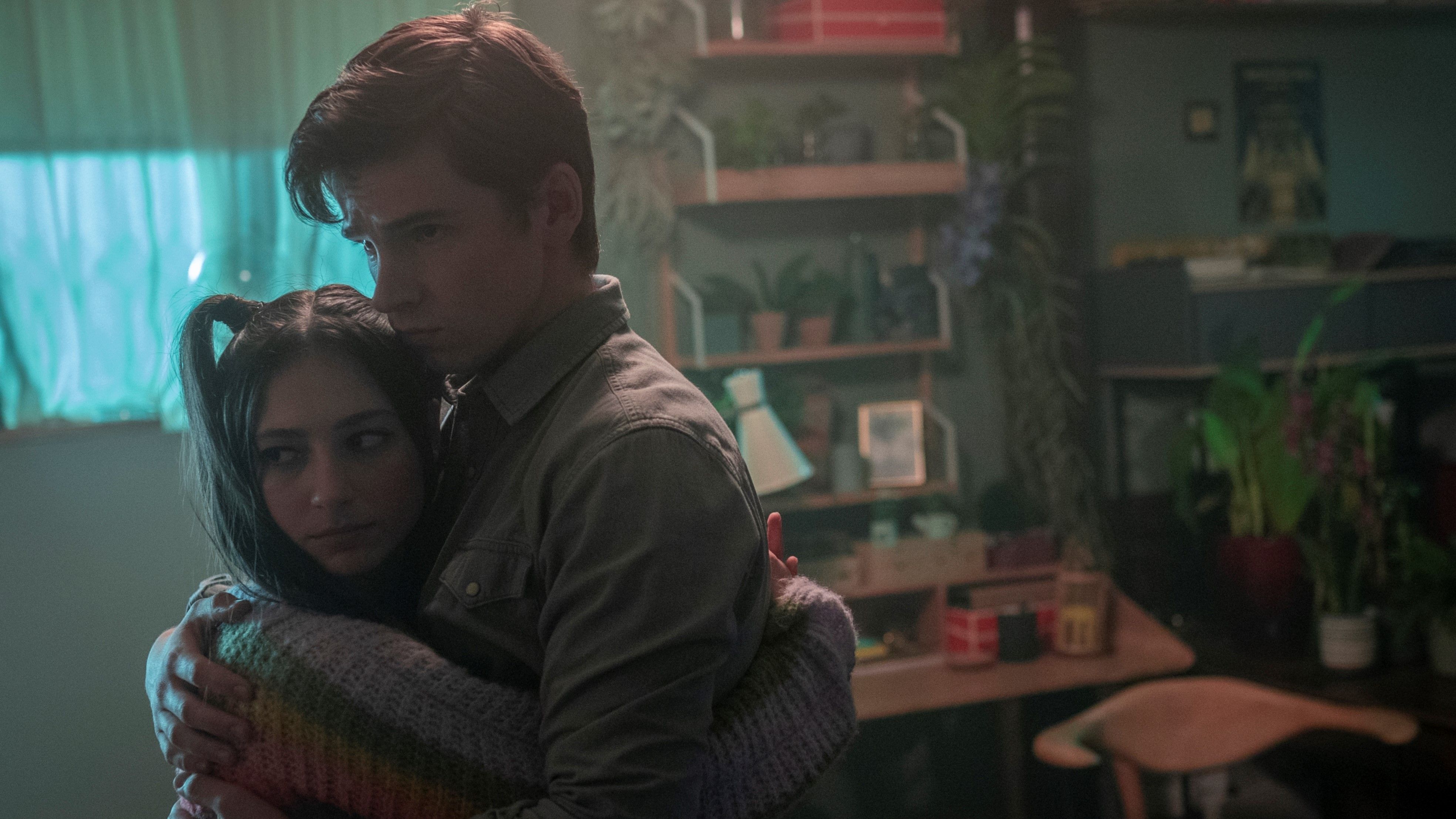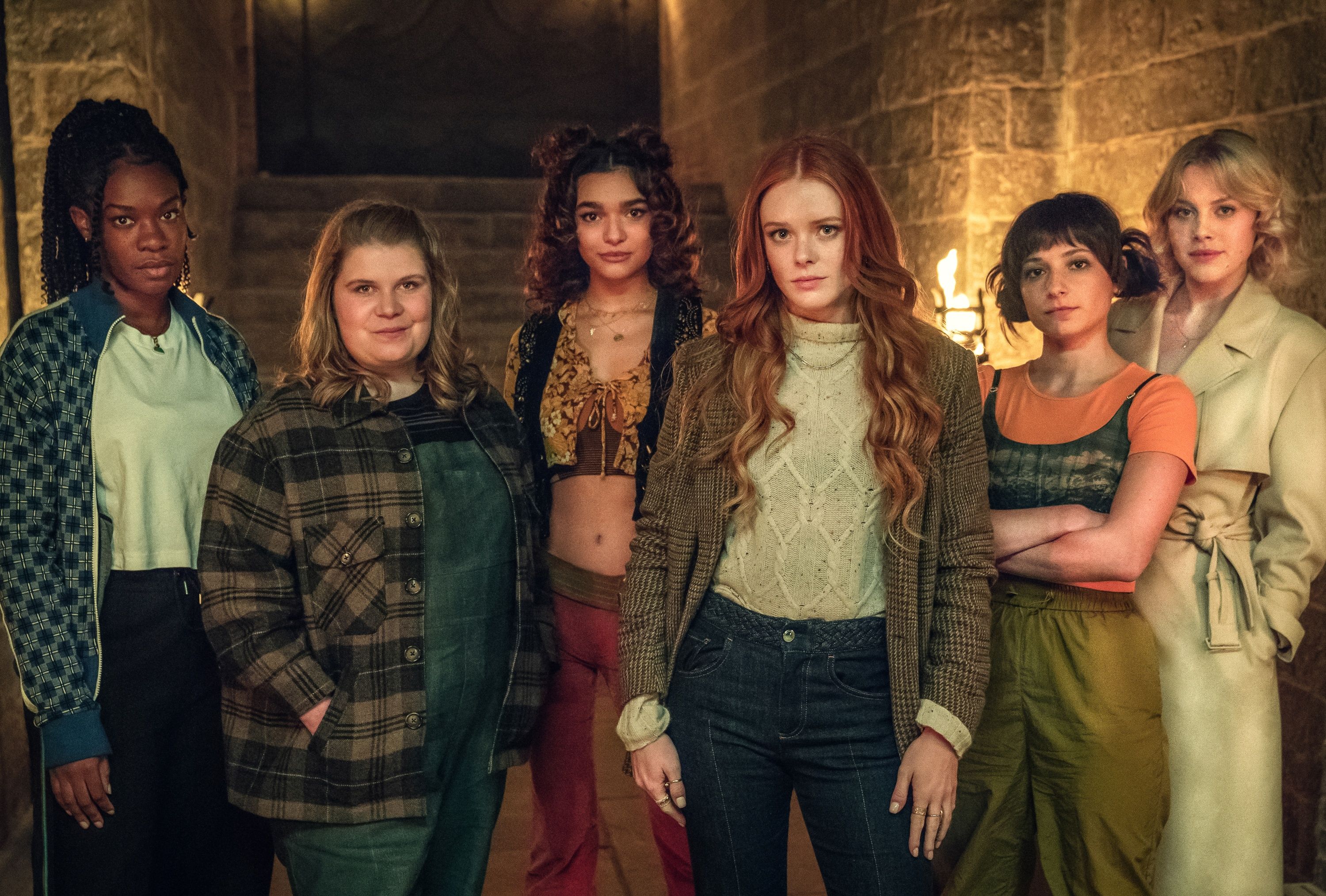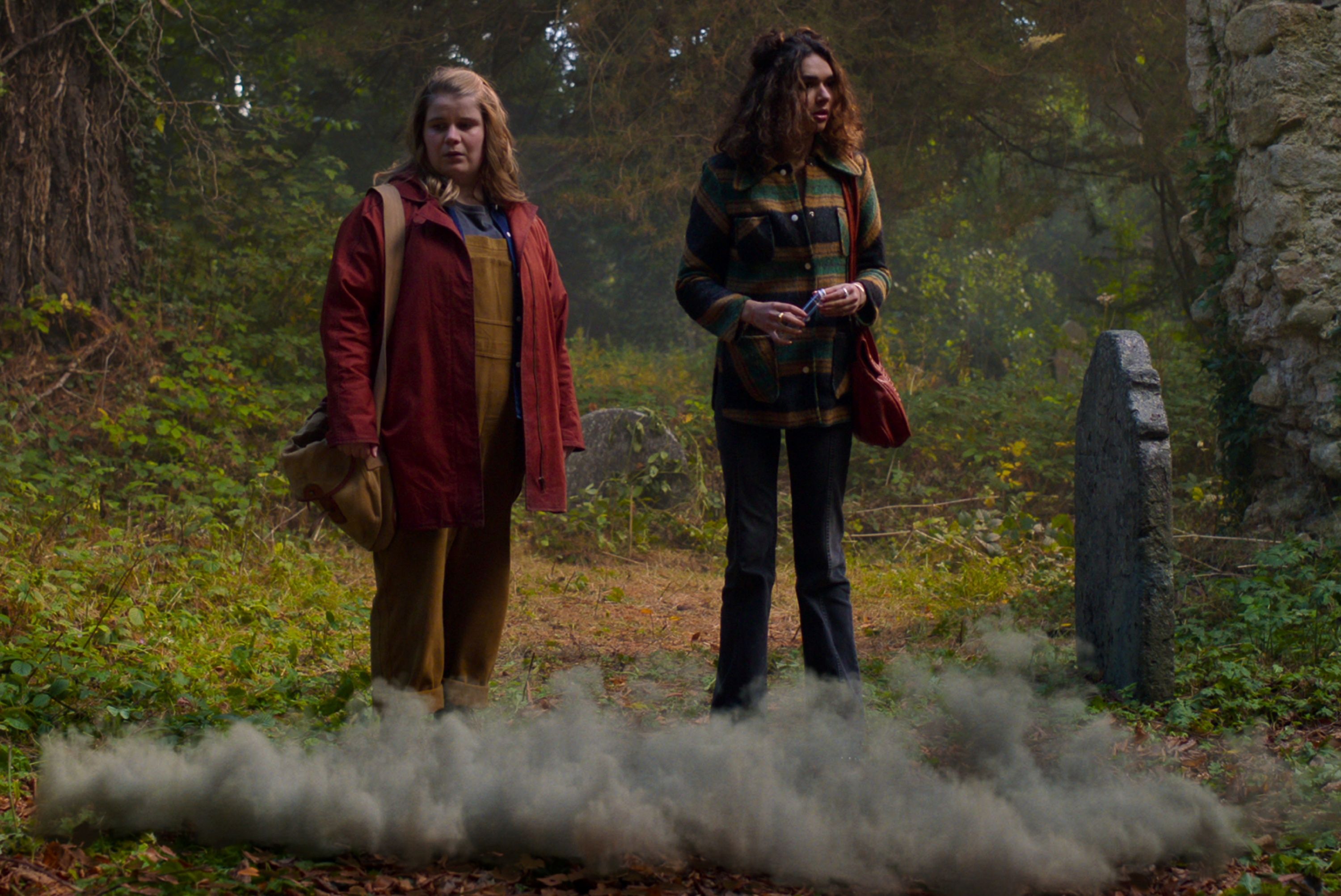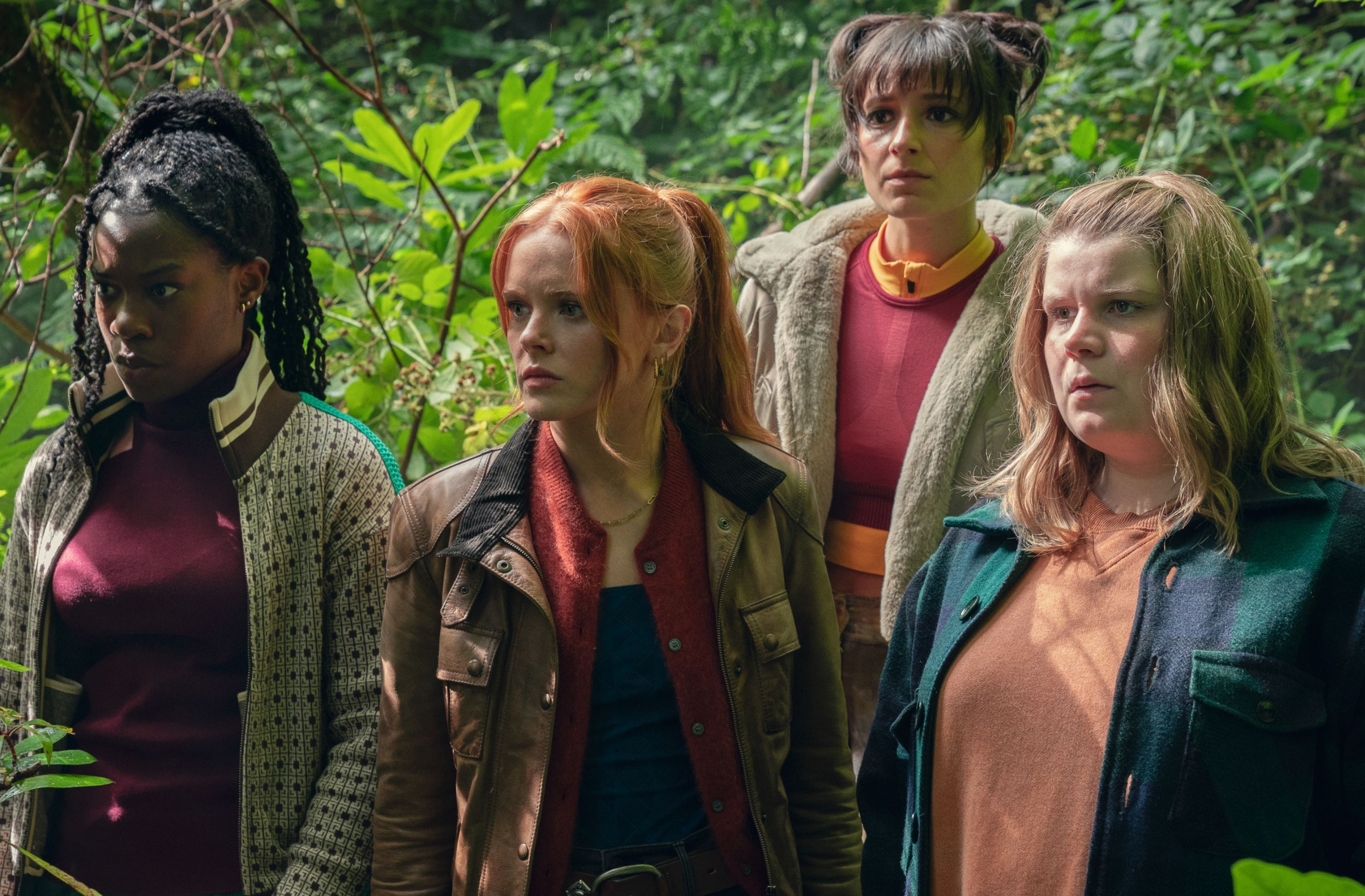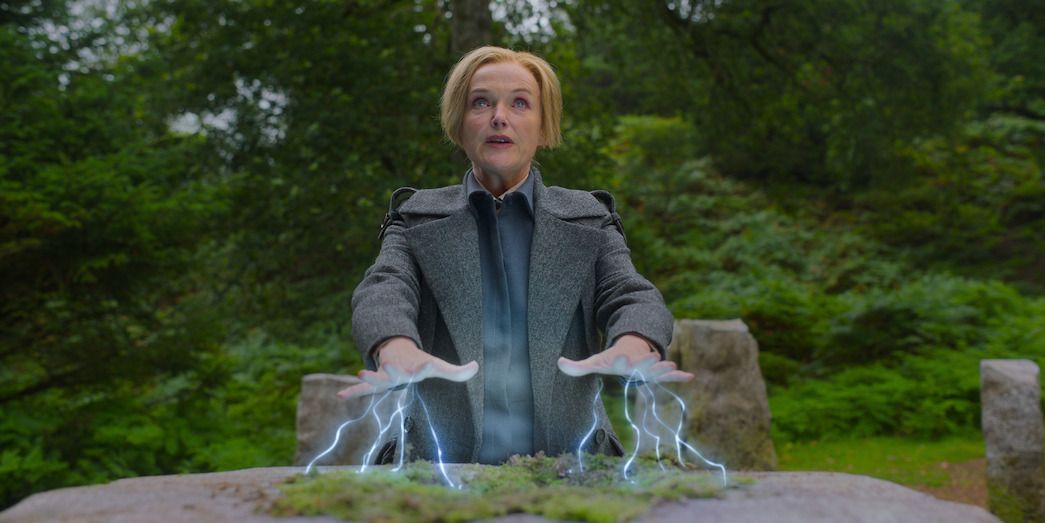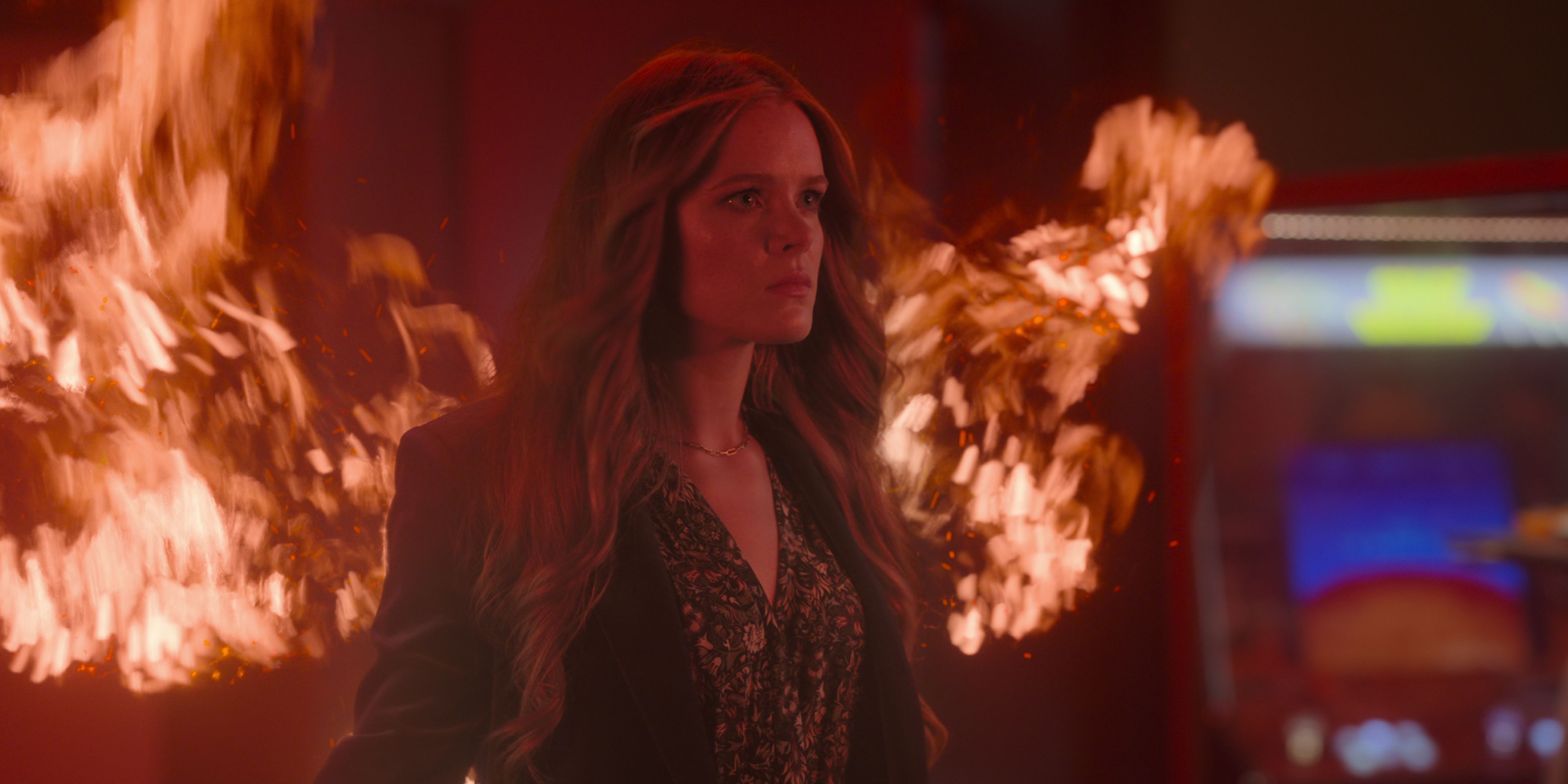Last year, when Netflix's fantasy series Fate: The Winx Saga Season 2 was filming outside Dublin, Ireland, I got to visit the set with a few other reporters to talk to the cast and watch them film the final episode of the season. Based on the animated series Winx Club, which ran for eight very popular seasons on Nickelodeon, the young adult live-action series centers on some of the students that attend a magical boarding school, who fight threats while studying to control their powers and learn about their past.
During a break in filming, creator and showrunner Brian Young came over to chat with us. During the wide-ranging, spoiler-filled conversation, he talked about what they hoped to accomplish in Season 2, his long-term plans for the series, the challenges of making a streaming show versus a network series, the mythology of the original source material, how they landed on seven episodes, and why they filmed the series in Ireland. He also talked about what they learned making Season 1 that they took to Season 2, and how at its core, Fate: The Winx Saga is about friendship.
Check out what Brian Young had to say below.
Fate: The Winx Saga stars Abigail Cowen as Bloom, Precious Mustapha as Aisha, Hannah van der Westhuysen as Stella, Eliot Salt as Terra, Elisha Applebaum as Musa, Sadie Soverall as Beatrix, Freddie Thorp as Riven, Danny Griffin as Sky, Theo Graham as Dane, Jacob Dudman as Sam, Ken Duken as Andreas, and Rob James Collier as Silva. Fate: The Winx Saga's Season 2 newcomers cast include Miranda Richardson as Rosalind Hale, Brandon Grace as Grey, Éanna Hardwicke as Sebastian, and Paulina Chávez as Flora.
QUESTION: When you're pitching with Netflix or when you're first getting this series off the ground, how much did everyone want to know that you have a five-season arc or a three-season arc? Did anyone want to know your long-term plans?
BRIAN YOUNG: Yeah, well luckily the source material is extensive, so there's lots of stuff to always pull from the source material. I always go into things believing that having a rough idea of where you want to go is great and then letting the story organically form as you start to tell stories, as you realize what characters are working, what characters are not working. And that's something that we learned on Vampire Diaries, which we managed to do... I was on it for seven seasons, it went another season after that. You let the story flow organically and I have a rough idea of where I want the characters to end when the characters do meet their end, whatever that is going to end up being. So just having a rough framework and then letting yourself and the writer play with the characters and play with their storylines and how they play out.
If I could just do a follow up, does that mean you have a five-year idea? What is your dream if you're able to do this?
YOUNG: So, the thing about a young adult show in this kind of world is that it takes us usually a year and a half to two years in between seasons. So there is a limit where these characters will eventually age out. So finding a limit to this part of the story is important to me. And then if the show were to continue on, us feeling like, how can we evolve this story in a new way? How can we start telling it in a different way so that we give additional life to the story, but still feeling like there is a beginning and middle and an end to this story that we started telling in season one. And we will finish telling when season whatever happens.
Speaking to the source material, there's so much extensive stuff and so many things that fans are excited to see or hear. Last season we heard about the dragon's flame. I'm sure fans are probably really excited to hopefully hear more about Domino later on. So how do you pick and choose what from the source material they'll take, especially because there's so many iterations of Winx now that you can from. How do you make those hard decisions?
YOUNG: It's really tricky, but it's kind of an embarrassment of riches just in terms of the amount of mythology that the original source material has. So for us, it's really about trying to figure out what part of that fits into a YA world that's not necessarily a kid's world and picking and choosing those pieces and then finding our big tent poles of what were things in the cartoon that we really wanted to make sure played into our mythology and how can we take some of their mythology and really twist it in an interesting way so that it's not just the story that they've already potentially seen before. So it's a new story, a new version of the story, a new twist on the story.
And speaking to that, also the addition of Flora this season was so monumental to so many people, myself included being Latina and seeing her finally be in this story. How did that decision come to be made? I know there was a lot of controversy around it, but how did you guys organically decide, okay, we're going to add her to this story, into this group of fairies and how is she going to play into that?
YOUNG: Yeah, we were always planning on bringing her in season two. She was always part of the world. We wanted to make sure that she remained in the world in season one. And Paulina is lovely and she's phenomenal and the fans are going to fall for her. I fell for her. She's just this really great energy that we inject into the suite, which is also great because once you've got an established group of people adding a new element, adding a new character, adding new relationships, it always shakes things up in a really interesting way and always gives additional storytelling opportunities because whenever a new presence comes in, it shakes longstanding relationships and it shakes everything. So Flora's been sort of a dream.
Obviously a lot of fans have a lot of things to say about season one. Have you taken any of that on board? Are you just like, this is what we want to do, trust the process?
YOUNG: I've worked on a fandom show before, which it's great and I'm going to plant my flag and say it's really exciting having a passionate fan base on a show like this. They are driving the conversation, they're driving a lot of online chatter about things and yeah, they've got a lot of opinions about stuff. A lot of stuff is stuff that we were already planning on doing, which is always exciting to see them start talking about things and realizing these were the stories we were already planning on telling. But at a point you have to say no, these are the stories that we all want to tell. And the audience for the show is... We always want to include the original Winx audience, but we always want to make sure that it feels like it's accessible to a broad audience that might not have seen the cartoon, that might not know what the cartoon is, but they can still have an entry point into the series.
I was a massive Winx fan growing up. Do you remember when they would change in the cartoon and they'd have totally new outfits?
YOUNG: Yeah.
Can we talk about that? Are we going to do that? I personally think it would be fine.
YOUNG: It's super tricky because us having a sort live action show versus an animated show. Look, I'm a Sailor Moon fan from back in the day, so I understand the makeover aspect of the transformation process, which is super important. But we have to separate out what we are able to do in a realistic world and what a cartoon is able to do in their world.
If you did it, it would look very strange. If you don't do it, people are going to be mad.
YOUNG: And that was something that was really important in season one. It was really important because in the DNA of a show like this is the transformation aspect, is the transformation process. And so it was really important that season one had that. And these are conversations that we had for season two really early on and how can we make sure that that's a fundamental part of the show and that'll always be a fundamental part of the show?
What are the biggest benefits that you've realized out of working with the streaming platform?
YOUNG: Not to toot my Netflix overlords horn too much, but I've loved working with Netflix. I really, really have. It's just been a great creative process and a great creative synergy of them supporting what we want to do on the show. And really, I don't want to talk about the way systems have worked in the past that I've worked under, but having a one-on-one relationship with our executives and feeling like they're our partners from the beginning, middle to the end of the show, has been really helpful. And having a one-on-one relationship with them has been... It helps eliminate too many voices in a room, which sometimes makes it really difficult to create a creative product.
In speaking to that, as you said previously, you have this longer amount of time between production, between seasons, whereas before, working on Vampire Diaries, it'd be like two to three months as a break and then you're back on set getting ready for whole new season. How has that affected you in the writer's room in terms of creating the stories and really getting down to the nitty gritty of what you want to do and say?
YOUNG: It is tough. I will say that much. One of the things that was beneficial in the broadcast model is because things are happening as you are going, you're able to switch gears as quickly as possible and you have a whole room of people able to help you switch gears when things are working, when things aren't working. The way this process has worked, because we have the writer's room and then we have the production as two separate parts of the process, when the realities of production start as they do, you need to make changes, you need to make shifts.
So that's been a shift for me just personally as a creative to try and change the way that I look at how we write and create a show like this. The benefit is with the amount of lead time that we have and then post time on the end, we are able to really make the VFX sing, to make the show feel like it's the best version of itself that it can be without feeling like... In broadcast it's like you're on a track and there's like a freight train coming at you and you just got to run. And you just got to run and the train's going to hit you eventually, but you've just got to keep running.
And this part of the process has let us... I don't think we would be able to achieve the level of polish and the level of VFX mastery that I think season one had. There's no way you could do it in a broadcast schedule. And so that's been part of the benefit of working in a streaming platform, working in this new TV model that's been happening.
Yeah, and also the decision of doing short seasons because season one was only six episodes. This is now I believe eight, if I'm correct.
YOUNG: Seven episodes this season.
Yeah, so how does that also affect y'all in that way?
YOUNG: It's tough. I will say that with an ensemble show, there are so many characters and there are so many storylines. So structuring a TV show like this is a challenge. And coming from a 22 episode a year model to a six or a seven episode a year model has been a shift in a creative way. But what I will say is, we would always say that there would be a couple episodes a year that felt a little bit like filler episodes in a broadcast season. There are no filler episodes in this show.
We want the audience to start watching in episode one and then binge all the way through episode seven, which we found out that happened a lot in season one. People watched over a night, definitely over a weekend. And just being able to bring the audience back episode after episode after episode and give them a whole story in a weekend is really, really exciting, if a little depressing when they're done. And we've been working on it for two, but that's fine, but live and let live. So yeah, that's been a shift, but it's been a good shift.
How would you describe or characterize season two? I think you said season one was kind like a who am I season?
YOUNG: Yeah.
Not just for Bloom but for everyone.
YOUNG: Yes.
So what's the theme for season two?
YOUNG: Yeah, so season one, I always try and think of what's a question that people this age will be asking themselves and who am I is always going to be at the core of what the show is. So it's always going to be a coming of age story. Season two, I think the question we talked about a little bit was what am I going to be when I grow up? And there's a little bit of this when you're in this age, you're starting to figure out what does my life look like? What does my life look like when I'm out of this school environment, when I'm out into the world and for these fairies, what does their life look like with these powers? And for Bloom specifically, I have this thing which she comes to learn over the course of the second season.
She has this really special thing inside of her. So what does that mean for her life? And as somebody who didn't grow up in a school like this, where what you do after school is something that they always had in their lives. Bloom never had that. So the idea that she's going to be an artist or an engineer is not a reality anymore because she has this massive power inside of her and she has a bigger destiny. And how do you wrestle with that when you had a more normalized idea for what your life was going to be? And I think that's part of the journey that everyone on the show is going to have in season two, is trying to figure out where their place fits into the world.
I'm curious, your first season was six episodes, your second season is seven.
YOUNG: Yep.
Was it a Netflix thing that said, "We want you to do six, we want you to do seven"? Was there any push or pull about, "Hey, we would love to do eight"? Because some other showrunners I've spoken to say that, "Listen, you can do as many episodes as you want, but this is your budget." I'm just curious how you decided on those numbers.
YOUNG: Well obviously, we wanted to maintain the level of quality of the show and make sure this show is a heavy VFX show. It's a big spend in that way. So making sure that every episode of the show felt like it was an important episode and had level of magic and level of monsters that we want, is the most important thing in my mind. So what I didn't want to happen is I didn't want us to feel like we had a bottle episode jammed in the middle of this seven episode season. So just finding the balance between those two worlds and those two realities.
Was it your decision for seven or did Netflix ever say, "You can do eight." How did you figure out that number?
YOUNG: Yeah, we always just take all the different things into account of how much money we have to spend and how we can spend it in the best way possible. And that's been the reality of the season.
You're talking about the fairies, learning about their futures and figuring that out. How much is Bloom's past going to play into that? Because I'm also a massive original Winx fan, so knowing Bloom's families and the history behind that, are we going to see more of that now in season two as we fully discover things maybe?
YOUNG: So, in season one, obviously the sort of spine of season one is Bloom trying to figure out, who am I? Like who am I in this world, what is my backstory? I'm a changeling, I have a backstory that I'm still trying to discover. In season two, she starts the season realizing the sacrifices and the actions that I took in season one to discover that backstory, had some pretty disastrous consequences for me and for my friends and for everybody. So there is a resistance, I think, at the beginning of season two where Bloom is a little bit worried about the answers that she would find if she continues looking. But of course deep down in her soul, she cares and she cares and she wants to know. And as our mythology expands in season two, the core of who Bloom is is going to be important to that. And obviously that's going to be something that she still has to figure out. And that mystery... We'll answer some questions in season two. They'll be more questions for season three, but yeah, that's still core to who she is.
And as you mentioned before, seeing these characters slowly age out. In the animated series we see them get engaged, get married, have their relationships and their friendships really grow. And as they become now women, how do you imagine this going? Is this, as you mentioned you're viewing this as a young adult series, so is this only seeing them in Alfea or hopefully maybe more?
YOUNG: Look, if people keep watching the show, we'll keep making the show. So I think that's the exciting thing about this world is that right now it is focused on the school, but the world itself is really big. And these characters who I love so much have the potential to have these bigger lives. And I think the tricky thing with a young adult show always is how do we maintain this bubble that they exist in, where they're living with each other? And for me it's part of the DNA of the series, is them all together. I think once you start fracturing these stories, it becomes harder to tell cohesive stories with them all together. So obviously we're all creative people, we can come up with ways to keep them in each other's orbit, but that would be the challenge moving forward. But like I said, if the audience keeps coming, we'll keep making.
What are the benefits of filming here in Ireland that you've noticed?
YOUNG: I love Ireland so much and that is not an exaggeration. We're almost done in a week. And then I will go to London for post and I am sad. I love it here. And we shot Vampire Diaries in Atlanta. You can walk outside and you can point a camera anywhere here and it's the most beautiful thing you'll ever see in your entire life and that shows up on screen. I think for a fairy world, having Ireland be our location is a dream. The crew is amazing, the people here are fantastic and it's just been a benefit all around. Obviously Kilruddery is five, ten minutes from the studio where we shoot also, which is fantastic. It feels like a fairy school so it's just... The stuff that we've been able to do in our little zone around the studio gives us everything that we need and lets us expand the world as much or as little as we want to.
And is Ireland always the plan or had you looked at other places?
YOUNG: We looked at a couple other places, but in the back of my mind, Ireland was always very present.
Did you always want to make Winx or did you want to make a dark reboot of something or was Winx always the plan?
YOUNG: When Netflix came to me, it's probably three years ago, with this cartoon that I'd known about and that I'd seen and I did some research on it and I realized that we could do for this sort of what we did for Vampire Diaries, which was Vampire Diaries was originally a book where we could age it up a little bit and I said this a little bit earlier, the key with a show like this is making it accessible for a really broad audience. So, the fans of Winx are super important to us and are key to our success.
But also you want people to be able to sit on the couch next to a non-fan of Winx and have them be able to watch and be engaged in it also. And so that was the big picture thing is how can we take this really great core idea and how can we broaden it out for a wider audience? And one of the fun things about the reaction to the show was finding strange people who you would not have expected to watch a show like this. I grew up in Florida, my dad's a fisherman, his friends saying, "I watched that show. It's not something I would normally watch, but I really liked it." So just finding those other audience members that we can bring into the tent and explore this world with has been a real joy.
The base material was really diverse, the cast in it is really diverse. Was that something that was so much easier to... Because it's hard to make stuff diverse enough that people who are mad because you've changed X, Y, and Z. So, was it easier to just go, okay, well this actually translates really easily into 2021 or 2020?
YOUNG: It really does. And this season we've got a lot of great cast members that we're introducing also. And so this world just has room to keep expanding in a really great way.
How has it been writing for characters this year specifically when you were writing first season, you didn't have-
YOUNG: It was tough, things first season. This year has been so much easier. I love the girls so much, I love everything that they do. And hearing their voices in your head, just as a writer, season one it was really difficult, I'm not going to lie. And then in season two you can hear them. You can hear them and you can see them as you're writing and it's great. They're also just all really talented actresses and all of our cast actors and actresses. So knowing that when you give them stuff, that they're going to be able to knock it out of the park and sometimes knock it out of the park in ways that you didn't expect is always a super big joy.
Often with the second season of a show... Each season, the studio will often give you an additional location, like an additional sound stage to build something. So, I'm just curious, what were you able to build in season two, or what were you able to add that perhaps you didn't have in season one?
YOUNG: In season two what we did is we leveled up our existing sets and our existing world. And that was really important to me, is that we take some of the amazing work that we did in season one and really added refinement and polish and then expanded the world a little bit more. I think we start in our similar world in the beginning of season two. And then over the course of the season we start to expand the mythology and expand the world. Then by the end of season two, we kind of blow the world wide open and find an entirely new location, an entirely new place for us place to visit.
So you're setting up season three?
YOUNG: Yes.
We're leaving Alfea a bit, maybe?
YOUNG: Yeah, this will always be our home. So Alfea will always be our home. Killruddery will always be our home. So as we start to broaden the world out, it's always going to be important that this remains our touchstone. But what I always want to make sure is that we never feel like we have satellite stories. I want to make sure that we're always in with our characters in our precinct, in our home. Because sometimes just as a personal thing, when we satellite our characters out too much, we lose some of the magic of the show. And the magic of the show is these girls interacting with each other and experiencing something that everybody has had experience with at one point in their life or another.
Can you talk about what you guys are filming today?
YOUNG: Okay, so in the stuff that's filming right now, we've got a big battle that's shooting later today, which is with our team, our specialists, and our new villain who are the blood witches this season and the blood witches, just to give a little bit of context, one of the blood witch's powers is their ability to take over the minds of the minds of our characters. So some of our specialists are fighting their friends and their allies who've been taken over by the blood witches, as well as the blood witches themselves. So that's the big battle stuff that we're filming today, which is super exciting. David Moore, who's our block three director, is a genius and, in Covid times, it is difficult to rally as many extras as you would normally be able to rally. So us with some VFX help and with some clever filming, we're able to fill out our world in that aspect. And then on the emotional side of it, and this is a big spoiler, am I allowed to spoil this?
Yeah, we’re embargoed.
YOUNG: Okay. On our emotional side of the story, this is our goodbye to Farah Dowling. So over in episode six of this season, our girls will have learned that what the true fate of Head Mistress Farah Dowling and will bring her back to life in a magical form. Life and death mean something on this show so she's not able to come back to life permanently. It's in a temporary thing, which lets her impart advice to the girls and give them a pep talk before our final battle in episode seven. You'll see Eve Best is not actually here today. Because of limitations of Covid, we're not actually able to get her on location for us. So we are going to shoot her in I think a week or two in London on green screen and use the magic of the magic of VFX to give us that emotional goodbye.
I'm super excited about it. It was really important to me that we gave our characters the chance to really experience and mourn the death of Dowling in an emotional way, in a way that didn't feel rushed and felt like we were able to say goodbye to the character in a really important way. Obviously the shock of the end of season one was that she was murdered in cold blood. Part of the storyline in season two is Rosalind being able to manipulate everybody and convince them to be on her side. One of the things that we're trying to do with Rosalind this season, which is super exciting, Miranda Richardson will be joining us as Rosalind this season. Because of scheduling issues, Leslie Sharp wasn't able to make it. So we managed to get Miranda to come on board.
She's a brilliant actress. And so us being with Bloom as Rosalind starts to win over not only Bloom, but the entire school and it's a little bit like boiling a lobster, boiling a frog, turning the heat up slowly, where by the time it's revealed what Rosalind is capable of, we're already in Rosalind's clutches. So eventually we do find out what Rosalind did at the end of season one. And it's a game changing moment for our fairies and for Bloom. But we're able to really have a moment with Dowling where we get perspective and where we get emotional closure with that, which is what we are shooting today over there.
When you're making any TV show, the first season you're learning a lot about the infrastructure, how to actually make the show. How many days does it take to shoot this. What you can accomplish in your production schedule. So how did what you learned in season one impact season two, what were you able to gain?
YOUNG: Season two is bigger. And the thing about season one, which I think it was a little bit of learning curve for everybody, is just how complex this show really is. I think a lot of people go into YA shows assuming a sort of level of fasile-ness of world because it's, "Oh, it's just a YA show." But a show like this, we've got not just our emotional stories, not just our love stories, not just our family stories, but also fighting magic monsters. We have a lot of different aspects to the show, as well as balancing now this year, six fairies in a suite together and making sure that we're telling stories with them that feel whole and feel like each of them is getting their due.
So that was season one. It was a little bit of a struggle sometimes, but what we learned in season two, we were able to go into it with clear eyes in terms of how big the show is and make sure that we are prepared to hit all of those beats and hit all of those moments and it's bigger this season.
So I think that was knowing that it was going to be bigger, making sure that we had the ability to schedule it in a way that could account for the bigness of the show. We had more second unit days, we had more VFX, more everything to be completely honest. So that's also the benefit of a season two show is if season one is successful, it gives you the ability to expand the things that made season one great and expand the world.
I believe you guys did 57 million views in the first month, I forget the exact number, I apologize. Did that impact your budget in terms of Netflix saying, "Oh, this is a popular show, here's a little bit more money for season two"?
YOUNG: I don't know if I'm allowed to talk about that.
Oftentimes when a show is a hit, the studio might increase budget. You obviously have more money because you have seven episodes and you're talking about a bigger season.
YOUNG: Yeah.
Was Netflix like, "Oh, we're happy, here's a little bit more."
YOUNG: They've been very good to us.
Can I just ask, you were on Vampire Diaries, which started in 2008, 2009 but now over 10 years later, we're in a very different landscape.
YOUNG: Yep.
So was it female friendship, making them not really bitchy. I mean, I know we have a lot of battles and stuff, but there's no caveats or backstabbing at the core of it. They're all friends and friends make mistakes.
YOUNG: Yep.
Is that something that you had to think about harder because it's very different from the kind of teen shows that I had when I was 13.
YOUNG: It's funny, when I pitched the show, I said, and this is the benefit of also having an ensemble cast of great female characters, is that sometimes they're friends, sometimes they're enemies, sometimes they're heroines, sometimes they're damsels. They get to operate and occupy all of the different roles. And so we get to make sure that we are telling that broad variety of stories with them. But at their core, it's a show about friendships. So at their core, they care about each other and they love each other even if they do mistakes and this show is all about them, it's about their relationships. And that's always our touchstone and that's always something that we go back to.
Can I ask really quickly, we've heard what's going to happen with the fairies, but can you share a little bit of what we'll see with the specialists?
YOUNG: Of course. We've got new uniforms. The specialists are no longer using wooden swords to fight, which is a little thing I know, but they're practicing with real swords. Andreas is running the specialists at the beginning of the season. So that's a big shift in tone, I'll say, from Silver running them in season one. And what we will come to learn is our new monster this season has the ability to nullify fairy magic. So the specialists take on a really important role in season two, which they didn't necessarily have as much in season one.
We did see Silva getting some food. So what can you tell us about Silva?
YOUNG: Yeah, Rob, who is lovely and amazing and is such a great addition to our world, he starts the season in prison in Solaria and our girls break him out pretty early on in the show. And then what happens to his character and what happens to him becomes a Sky story really, which is Sky has these two father figures in his life. He has the more traditional, gives good advice, wants Sky to be a better person in Silva. And then Andreas, who has an idea of who he thought his son would be and is a little bit more rough around the edges. For Sky, what he thought about both Andreas and Silva were shattered at the end of last season. So Sky really has to wrestle with who am I and what path do I want to take?
And I had these two examples in front of me and do I want to take either example or do I want to forge my own path? And I think we explored a little bit in season one about making your parents real people. That sort of idea that we all go through more adolescence where you stop seeing your parents as your parents and start seeing them as actual adults that are fallible and that have good and bad qualities. I think Sky is really going through a crisis in his life and that's personified in both of those relationships with Silva and Andreas.
Fate: The Winx Saga is now streaming on Netflix.

